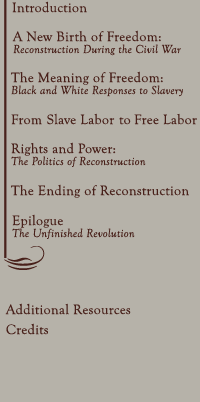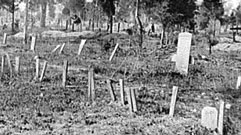




Memory and Mourning

1865
Graves of Confederate soldiers in Hollywood Cemetery, Richmond, Va.,
with board markers
Most Southern whites responded to defeat with grief and dismay. "The demoralization is complete," wrote a Georgia girl. "We are whipped, there is no doubt about it."
Privately, white Southerners struggled to come to terms with the appalling loss of life, a disaster without parallel in the American experience.
Many
women had taken on new roles during the Civil War, assuming greater and
greater authority for managing farms and plantations while their husbands
were absent, or serving as nurses, teachers, and in other professions.
The death of nearly 260,000 soldiers meant that women would continue to
fill these roles, even as they struggled to help surviving husbands and
sons adapt to the reality of defeat.
While
some white Southerners looked to the future and a New South, others turned
with nostalgia to a romanticized view of slavery and of the Confederacy,
increasingly remembered as a noble Lost Cause.
The establishment of cemeteries and Confederate memorial days reflected
this effort to carve out a recognition of the Confederate war effort in
the South's public space.
Copyright
2003